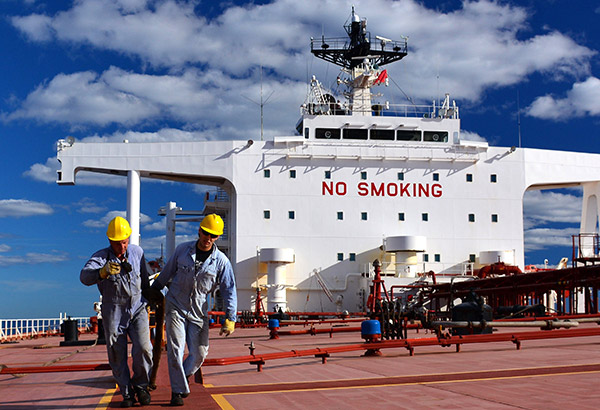
An Intensive 5-day Training Course
Managing Tanker Cargo Operations
Maximising Cargo Carrying and Minimising Turnaround Times for Tankers
Would an alternative date be more suitable?
We offer a variety of tailored training options, customized to meet your organisation's needs. Delivered anytime, anywhere, we make it easy to bring expert training directly to your team.
Why Choose this Training Course?
This PetroKnowledge training course is designed to provide an understanding of the types of bulk liquid vessels which are used and the reasons for the differences between them. It also looks at the cargo operations to be conducted and the critical elements of these operations. As Part of the operations the methodology of maintaining the cargo in optimum conditions are examined. Many cargoes are extremely specialized and therefore are very expensive. Loss of cargo to mismanagement is completely avoidable if it is properly managed. By understanding the type of cargo, the hazards it presents and the management processes, it is possible to minimize the risk of cargo spoiling, pollution and incorrect vessel selection thus making for a more efficient and cost effective overall operation. Major points:
- Vessel types and their construction
- Cargo care and measurement
- Ballasting operations and optimizing vessel discharge features
- Hazards associated with different cargoes and how to manage them
- Determining the most suitable vessel
- Interpreting and understanding the regulations associated with these types of operation
This training course will highlight:
- The differences between Oil, Chemical and Liquefied Gas Tankers
- The properties of different cargoes and the associated hazards
- Health, safety and environmental controls when working on tankers
- What is involved in the safe operation and monitoring of cargo on board tankers
- How to perform and monitor safe oil tanker cargo operations in compliance with legislative requirements
What are the Goals?
By the end of this PetroKnowledge training course, participants will learn:
- The main requirements of cargo operations in compliance with legislative requirements
- To understand the principal physical and chemical properties of tanker cargoes
- Awareness of hazards relating to health and safety and prevent pollution of the environment
- Methods to apply occupational health and safety precautions
- Principles of how to respond to emergencies
Who is this Training Course for?
This training course is suitable to a wide range of professionals but will greatly benefit any person who deals with any aspect of tanker cargo operations. This may not be direct involvement but may require individuals particularly at a higher level who should understand the issues with tanker cargo operations. In particular:
- Senior Management with high level responsibility for tanker operations
- Fleet Managers
- Vessel Charterers (Aids ability to select the correct vessel)
- Technical Managers (Aids understanding of maintenance issues)
- Vessel personnel wishing to progress in their careers
- Refinery personnel at the vessel/facility interface
How will this Training Course be Presented?
Participants to this training course will receive a thorough training on the subjects covered by the seminar outline with the Tutor utilising a variety of proven adult learning teaching and facilitation techniques. Seminar methodology include.
The structure for this course is based around a power point presentation supported by video clips and class-based exercises. Examples of the properties and problems that can be encountered with the cargoes are demonstrated. Exercises will be based on scenarios that have happened or will be comparable to real time incidents. All exercises will use standard IMO/ Flag state pro- forma.
Organisational Impact
- Improves individual understanding of the impact of tanker operations
- Helps to build team structures in cargo management
- Assists in prevention of environmental issues and their control if they occur
- Demonstrates the criticality of cargo separation
- Provides knowledge of safe methods of cargo transportation
- Contributes to the competence of personnel in a structured competence scheme
Personal Impact
Individuals will benefit from enhanced knowledge of cargo handling methodologies, emergency response techniques and HSE issues. Individuals will benefit by:
- Better understanding of operational structures
- Appreciation of the importance of properly structured procedures
- Increases awareness of hazards presented by different operations
- Learning techniques to ensure vessel integrity is not compromised
- Practicing methodologies which will aid incident prevention
- Understanding how emergencies occur and how to manage them
Daily Agenda
Day One: Regulations & Properties of the Cargoes
- Regulations and Codes of Practice
- Defining hydrocarbons
- Hazard warning symbols, MSDS and COSHH
- Characteristics of hydrocarbons
- Electrostatic charges
- Safety equipment
- Work site control
Day Two: Vessel Construction and Pollution Prevention
- Effects of pollution
- Vessel Types
- Oil Tanker Construction
- Chemical Tanker Construction
- Liquefied Gas Tanker Construction
Day Three: Oil Tanker Cargo Operations
- Cargo system Components
- Loading and Discharging Cargo
- Cargo care and tank cleaning
- Loading and discharging
- Crude Oil Washing
- Purging, Gas freeing and Inerting
- Inert Gas system
Day Four: Chemical Tanker Operations
- Cargo care and compatibility
- Monitoring techniques
- Tank cleaning
- Cargo hazards
- Loading and discharging
- Flammability and Corrosivity
- Toxicity
- Emergency procedures
Day Five: Liquefied Gas Carrier Operations
- Defining LNG and LPG
- Properties and hazards
- Cryogenic safety
- Electrical safety
- Brittle fracture
- Loading and discharging
- Cargo care and compatibility
- Managing hazards
Certificate
- On successful completion of this Training Course / Online Training Course, a PetroKnowledge Certificate / E-Certificate will be awarded to the delegates.
